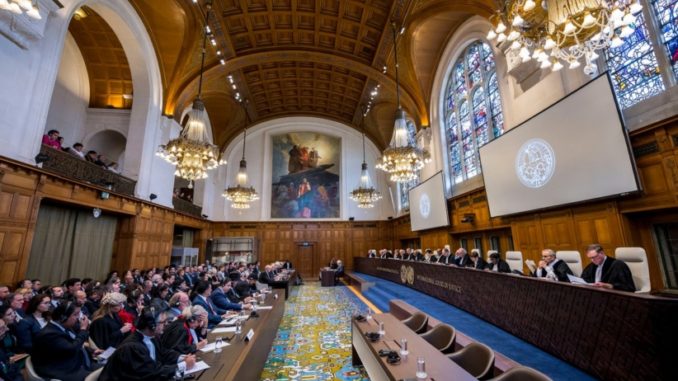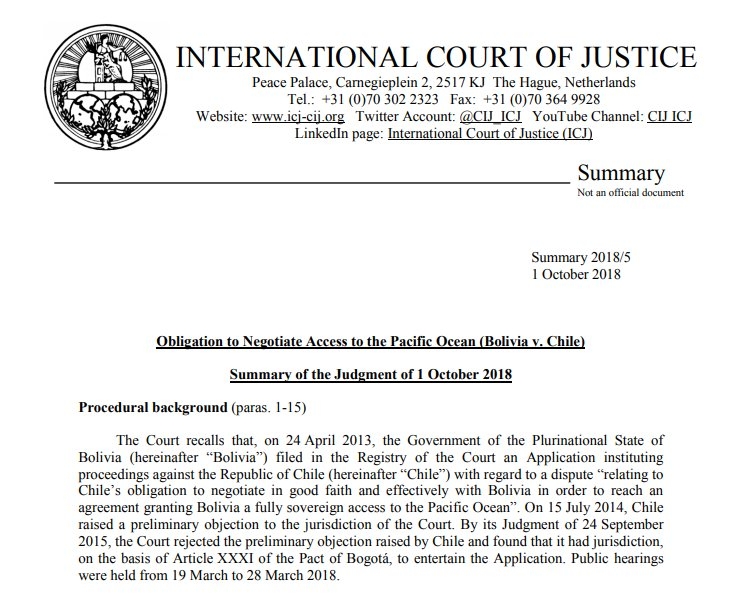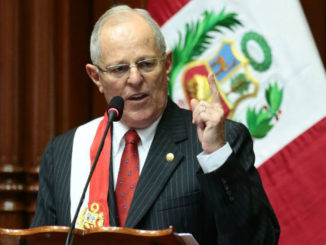
THE HAGUE – The International Court of Justice (ICJ) on Monday ruled that Chile does not have to negotiate access to the Pacific Ocean with Bolivia, frustrating hopes of resolving a bitter dispute dating back to the late 19th century.
Judges at the United Nations’ top court, based in The Hague, did not rule on whether Chile or Bolivia had the rights to the disputed coastal stretch, it only ruled on whether Chile had an obligation to negotiate with Bolivia.
“The court […] finds that the Republic of Chile did not undertake a legal obligation to negotiate a sovereign access to the Pacific ocean with the Plurinational State of Bolivia,” said ICJ President Judge Abdulqawi Ahmed Yusuf.
The judge announced that the court found by 12 votes to three that Chile cannot be forced into dialogue with its Andean neighbor.

The ruling is a major setback for President Evo Morales, who was present at the court in The Hague as the ruling was read out.
Landlocked Bolivia lost access to the sea in 1884 after a war with Chile and has tried to regain it ever since. Already one of the poorest countries in Latin America, Bolivia says the lack of sea access has hampered its economic growth.
The ruling, which comes after five years of deliberations, is final and binding.
Judge Yusuf said that he hoped that “with willingness on the part of both parties meaningful negotiations can be undertaken”.
Bolivia has long argued that Chile has been ducking legal obligations to enter negotiations that are outlined in resolutions from the Organization of American States (OAS).
Chile, however, says the issue was resolved by a 1904 peace treaty between the two countries and points out that Bolivia already has duty-free access to the Chilean port of Arica.
Speaking at a press conference in Santiago after the ruling, Chilean President Sebastian Pinera celebrated the “great triumph of the Chilean cause” in front of a crowd who chanted “Viva Chile”.
Hoy hemos vivido un triunfo histórico para Chile, el derecho internacional, el respeto a los tratados y la defensa de nuestro territorio, mar y soberanía. La Corte de La Haya rechazó categóricamente la demanda de Bolivia y confirmó íntegramente nuestra posición. ¡Viva Chile! ?? pic.twitter.com/zBF4A5ImbM
— Sebastian Piñera (@sebastianpinera) October 1, 2018
Pinera said his country has always had an “attitude of reconciliation” towards all others, particularly their neighbors, but that Chile would always defend its sovereignty.
Pinera said Chile “has never had any obligation” to negotiate sea access and that “President Morales raised false expectations among his people (…) and made us waste five years which could have been spent building a healthy relationship between the two countries.”
Despite the final nature of the ruling, Bolivian President Evo Morales said “Bolivia will never give up”.
Saludamos al pueblo boliviano. Este #1Oct será recordado en la historia de la región. Escuchamos atentamente el informe de la #CIJ, que si bien no establece una obligación a #Chile de negociar, sí invoca a seguir dialogando por una salida al océano Pacífico para #Bolivia. pic.twitter.com/3fTF2mwdcW
— Evo Morales Ayma (@evoespueblo) October 1, 2018
The president, who has been in power since 2006, is running for a fourth consecutive term in 2019 and the issue of the access to the Pacific Ocean is an emotive issue for Bolivians.
The long-simmering dispute boiled over in 2013 after Bolivia filed a lawsuit with the ICJ, which settles legal disputes between UN member states, in an attempt to force Chile to negotiate sea access.
The borders between the two neighbors date back to the 1904 Treaty of Peace and Friendship, signed after Bolivia lost 400km (250 miles) of coastline to Chile during the War of the Pacific (1879-1884). Chile and Bolivia have not had full diplomatic relations since 1978.
Despite having no access to the sea, Bolivia maintains a small navy and celebrates the Day of the Sea every year.



